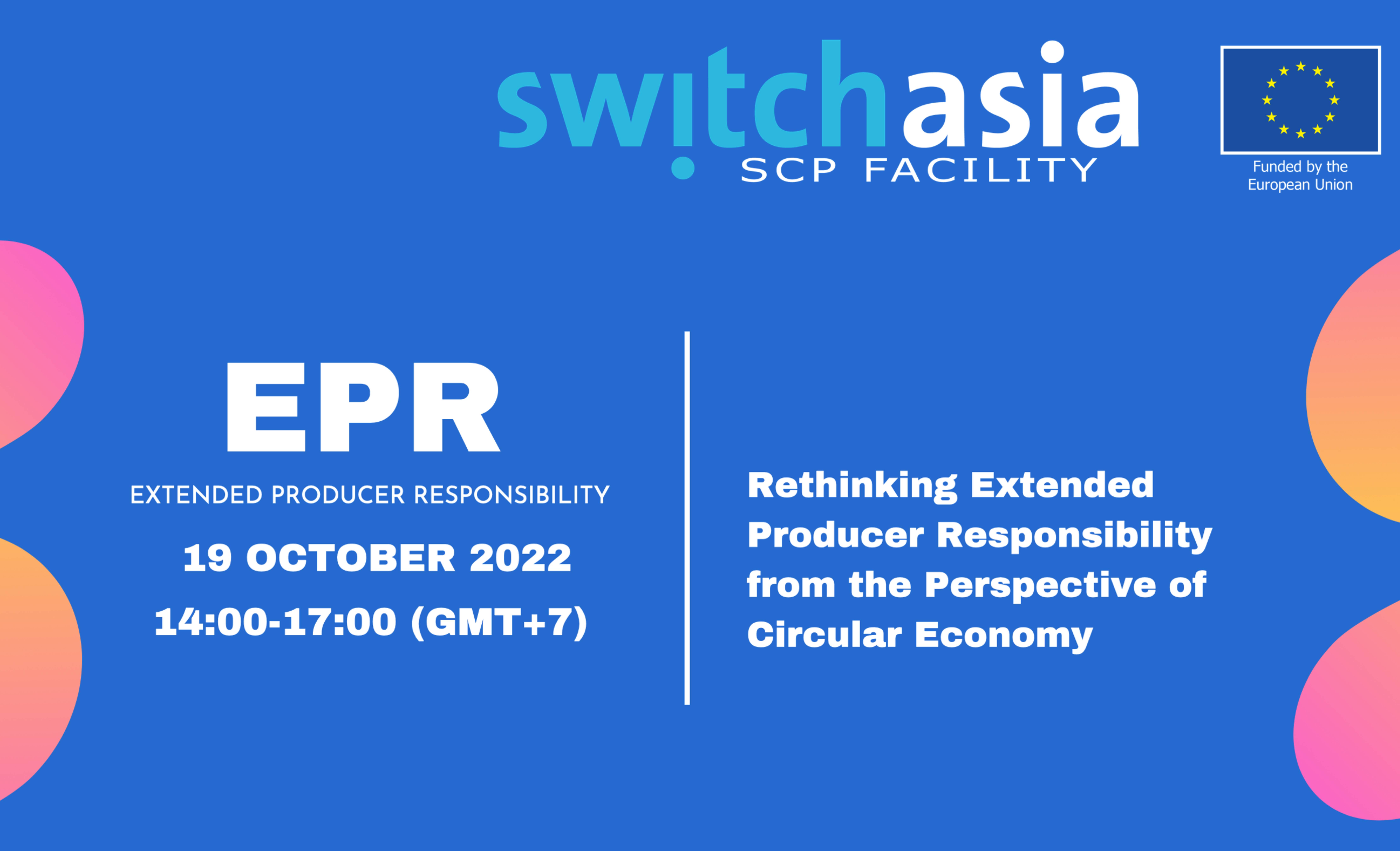
When: 19 October 2022 I Time: 14:00-17:00 (Bangkok Time) I Webinar Recording HERE
Background
Extended Producer Responsibility (EPR) is seen as a strategic approach that helps to bring materials, at the end of useful product life, back into consumption and production systems. Formulated in 1990 in Sweden by Thomas Lindqvist, it was intended to empower producers to deal with the end-of-life treatment of discarded products by, among other measures, focusing on the upstream measures, including product design. This was intended to ease waste management burden of governments.
In a view of growing interest towards EPR in Asia, the SWITCH-Asia SCP Facility seeks to critically examine experiences of EPR application by looking at practices in a selected number of countries as well as through discussion with the experts. It is done in order to arrive at better understanding of challenges for EPR to be effective for facilitating circular product design.
As such, SWITCH-Asia SCP Facility initiated the project: Rethinking Extended Producers Responsibility(EPR) from the Perspective of Circular Economy (2022) and a report will be prepared as an output of this project. The project has gathered experiences from India, Malaysia and Thailand, as well as, relevant learnings from Europe and countries globally.
Objectives
This Pan-Asia webinar will provide an opportunity for all interested stakeholders in Asia and beyond to listen to the findings of the project and the conclusions of the group of researchers.
Outcomes
Expected results from the webinar are to spread the understanding of the challenges related to developing Extended Producer Responsibility based policies in the Asian context. A focus is on how EPR-based policies can contribute to societies based on circular economy visions. On the ground experiences and challenges for EPR implementation will address the following points:
- Roles and accountability of critical stakeholders
- Capacity building of stakeholders
- Development of collection systems including the role of local governments and producers
- Existing or planned EPR rules
- Establishment of correct costs of EPR compliance for producers
- Enforcement challenges
- Enhancing digitalization to enable circular economy
- Informal sector integration
Targeted Participants
The webinar is addressed to a broad audience of people interested in Extended Producer Responsibility issues and policies to lower the environmental stress from the modern consumption society with a special focus on an audience working in and with Asian countries. The webinar will pay special attention to the challenges of making EPR policies support a development towards a circular economy.
Speakers
 Dr. Thomas Lindhqvist, Associate Professor, IIIEE, Lund University
Dr. Thomas Lindhqvist, Associate Professor, IIIEE, Lund University
Thomas Lindhqvist worked with EPR and other product policies from the International Institute for Industrial Environmental Economics (IIIEE) since early 1990. He has supported producers, governments, international organisations and NGOs to develop and implement EPR for various products. He has a PhD from Lund University and worked as Associate Professor at IIIEE.
 Dr. Panate Manomaivibool, Assistant Professor at Mae Fah Luang University
Dr. Panate Manomaivibool, Assistant Professor at Mae Fah Luang University
Panate Manomaivibool is a lecturer at the School of Science, Mae Fah Luang University. He also heads a research center, Circular Economy for Waste-free Thailand (CEWT). He works with communities, local governments, companies and NGOs for workable zero-waste solutions to advance the circular economy. Dr.Panate holds a PhD from IIIEE, Lund University.
 Mr. Pranshu Singhal, Founder Karo Sambhav
Mr. Pranshu Singhal, Founder Karo Sambhav
Pranshu Singhal founded ‘Karo Sambhav’ which designs and implements Circular solutions for multiple waste streams by collaborating with producers/brands. He was recently conferred ‘Social Entrepreneur of the Year 2021 India’ award by Schwab Foundation, a sister organization of WEF. He has worked as Director, Digital Learning for Microsoft and as Head, Sustainability for Nokia. He is an Aspen Fellow, a Ashoka Fellow, a Chevening Fellow, and an Aspire Circle Fellow. He has a Master’s from IIIEE, Sweden.
 Mr. Hun-Yang Soon, CEO Eco-Ideal Consulting Sdn. Bhd.
Mr. Hun-Yang Soon, CEO Eco-Ideal Consulting Sdn. Bhd.
Founder and CEO of Eco-Ideal Consulting in Malaysia, a company specialising in waste and carbon management in Malaysia. Hun is a certified International Waste Manager (International Status) under the International Solid Waste Association. He has 22 years of experiences in waste management consultancy, including EPR experiences in used tyre, e-waste and packaging waste in Malaysia.
Highlights







